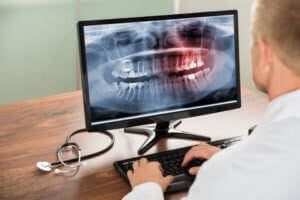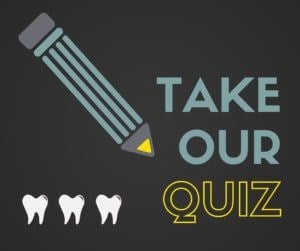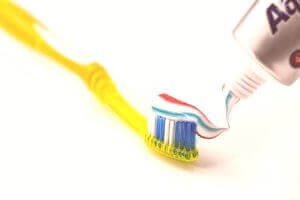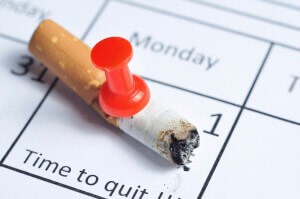
In the time before modern dentistry, wisdom teeth were essential. Lack of good dental hygiene led to extensive tooth loss. So when it came time for these third molars to emerge in the back of the mouth, there was plenty of room to welcome them. Today, dental technology is more advanced than ever, and adults are able to repair and keep more teeth than they were even only 50 years ago. The wisdom teeth, however, are now problematic. Often, removal is necessary to prevent problems, especially if they are impacted.
What has impacted wisdom teeth?
Wisdom teeth typically emerge between the late teens and early 20s. While some people are born without wisdom teeth, the majority have four— two on the top and two on the bottom. When they grow in at an awkward angle or if there is not enough room for them, they become impacted. Roughly 60 to 70 percent of all wisdom teeth will be impacted. Your family dentist can monitor your growing wisdom teeth and track their growth through regular dental X-rays. If there is a problem, the teeth may need to be removed.
What are the impacts of wisdom teeth symptoms?
Sometimes, impacted wisdom teeth don’t cause any symptoms, and the only way your dentist knows they are impacted is by examining your regular dental X-rays. However, as they progress, they can cause problems such as:
- Jaw pain
- Swelling, particularly around the gums or around the jaw
- Bleeding gums (though be aware that bleeding gums is also a symptom of periodontal disease)
- Bad breath
- Difficulty opening your mouth
- An unpleasant taste in your mouth
There are four different ways wisdom teeth may be impacted.
You may hear your dentist use these terms when describing them:
- Mesial impaction The tooth is angled too far toward the front of the mouth. This is the most common type of impaction.
- Vertical impaction These teeth are coming in fairly straight, but there isn’t enough room in the mouth to accommodate them.
- Horizontal impaction Teeth that are horizontally impacted are lying on their side.
- Distal impaction Distally impacted teeth are tilted toward the back of the mouth.
- Soft tissue impaction This occurs when the tooth has erupted through the gum.
- Bony impaction When the tooth is still within the bone but has emerged through the gum, it’s a bony impaction.
What are the 5 most common problems caused by impacted wisdom teeth?
Often, you may not realize the issues your wisdom teeth have created until it’s too late. These problems include:
- Damage to other teeth Crooked wisdom teeth can “crash” into the roots of neighboring teeth, causing structural problems.
- Damage to other teeth Crooked wisdom teeth can “crash” into the roots of neighboring teeth, causing structural problems.
- Pain Pain, swelling and a stiff jaw are symptoms of an impacted wisdom tooth.
- Gum infections If the wisdom tooth has started to break through the gum line, bacteria can easily seep through this opening, setting the stage for a gum infection.
- Extensive tooth decay Impacted wisdom teeth crowd teeth around them, trapping food particles in these hard-to-reach areas. The result is extensive tooth decay in areas where it’s difficult to floss or brush.
- Cyst Impacted wisdom teeth can create a cyst that damages the bone supporting teeth and the roots of neighboring teeth.
- Bad smelling breathe
- Having complications while opening mouth
- Pain in jaws
- Swollen and red gums
- Experiencing a bad taste in the mouth that will not vanish even after thorough brushing or flossing
- Tender or bleeding gums
Benefits of Wisdom Teeth
There are numerous benefits of keeping wisdom teeth, but the most common is how it prevents dental problems. The empty socket from the removed wisdom tooth often causes bone loss over time.
It is because of a lack of chewing stimulation that leads to structural changes in the face and mouth. So, retaining or maintaining wisdom teeth helps you keep your facial aesthetics and prevent severe dental problems.
Do you know where your wisdom teeth are?
If you’ve not had a regular dental visit or routine X-ray, you may be unaware that your wisdom teeth are impacted, particularly if you’re not showing any symptoms. Your local dentist can keep a close eye on your wisdom teeth pain relief and help you determine if removing them would be the best course of action. If you’ve not had a regular dental visit in a while, you should schedule one, particularly if you have dental insurance. Most dental coverage will pay for biannual checkups. Dental Express offers dental care for the entire family, including SmileCorrect, implants, emergency dental care and maintenance services. Our practice features compassionate care coupled with state-of-the-art dentistry at four convenient locations in San Diego: Downtown, Point Loma, Clairemont and Santee. Contact us to schedule an appointment today.
Sources: American Dental Association. “Wisdom Teeth.” Online. The Mayo Clinic. “Wisdom Teeth” Online. Animated teeth. “Wisdom Teeth.” Online.









